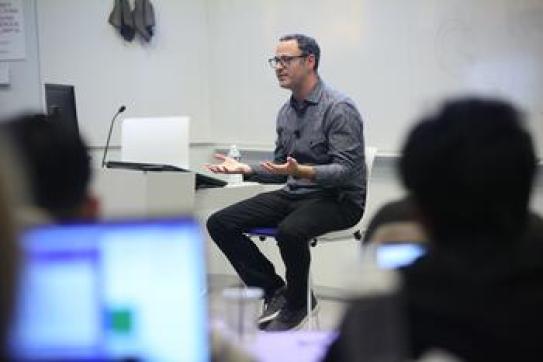Removing challenges for consumers and offering them technological tools that drive exciting shopping experiences are at the heart of Columbia Business School’s course titled New Frontiers in Retail: Magic and Logic.
This spring, the class paired two retail heavyweights, Kinshuk Jerath, professor of business in the marketing division, and Oliver Chen, adjunct professor of business, and managing director and senior equity research analyst at the investment bank Cowen. Prof. Jerath’s unparalleled academic knowledge and research combined with Prof. Chen’s Wall Street background created a unique learning environment where students were able to immerse themselves fully in the study of the future of retail.
Consumers looking to buy a new pair of eyeglasses or a perfect pair of pants and shoes to go with a favorite sweater now often find their online shopping experiences are enriched by virtual try-ons, personalized wardrobe suggestions, and rental as well as resale options. With your smartphone, you can place a pair of Warby Parker glasses on your face through augmented reality, or you can view six ensembles that match that bright, cashmere cardigan.
These shopping journeys are part of the ever-evolving world of experiential retail. Big advances in technologies such as AR and virtual reality and customer data platforms have had a significant impact on emerging and growing marketplaces. “This course is not about what has happened in the past,” says Jerath, “but about what’s going to happen next.”
Chen adds, “Mobile phones have become the new mall in many ways and a gateway to e-commerce. The integration of physical and digital, bricks and clicks, has been really impactful and meaningful as we think about new modalities and receiving goods.”
“How do you merge the virtual and the physical? How do you leverage your physical assets to drive excitement and engagement?” asks Chen, who, along with Jerath, focuses on those questions throughout the course.
“Change and disruption are opportunities,” says Chen. “This course prepares you for the future and really helps you think agilely.” Because change is constant and rapid, MBAs in the new world of retail marketing need to embrace it and have a new toolkit to respond with speed.
The two instructors provide frameworks that help students put into context what it means to create a better customer experience. One of those frameworks is magic and logic. The magic is the creative side of merchandising and anticipating what customers want to experience when they engage with products. Planning and implementing technology such as AI are the logic behind “surprise and delight” for consumers, says Chen. Another critical framework is called the three-Cs: a more “connected” retail experience, which understands “context,” and engages a “community” of customers.
Jerath notes two site visits focus on magic and logic and help students visualize the concepts in practice. They visit Saks Fifth Avenue and the New Jersey distribution center for Rent the Runway, a web platform that offers users options to rent, subscribe to, or buy designer clothing and accessories.
“Students see how the store runs, how it’s planned, and how Saks brings light to the customer,” says Jerath. In contrast, the major logistical issues that Rent the Runway must solve daily offer a look at the logic side. “Both sides are very important to running a tight retail operation,” he adds.
New Frontiers in Retail is highly focused on consumer analysis and learning to use data and customer interactions to maximize customer acquisition and retention, says Chen. “The course introduces students to a whole variety of new models and CEOs. We've had C-suite executives from Macy's, Walmart, Revolve, Warby Parker, Rent the Runway, The RealReal, and new companies and traditional companies, and much change is happening as all companies rethink data.”
Jerath says he and Chen want their students to be ready to create the future during customers’ retail journeys. “And we want to inform and educate them to think about all the important trends that are happening in retail right now, which will influence the industry for the next decade.”
“Columbia's at a unique place in terms of [being] geographically at the center of so much retail innovation,” he says. “And the Columbia curriculum really supports the development of many facets of what we're seeing in this broad industry as well.”
About the Researcher

